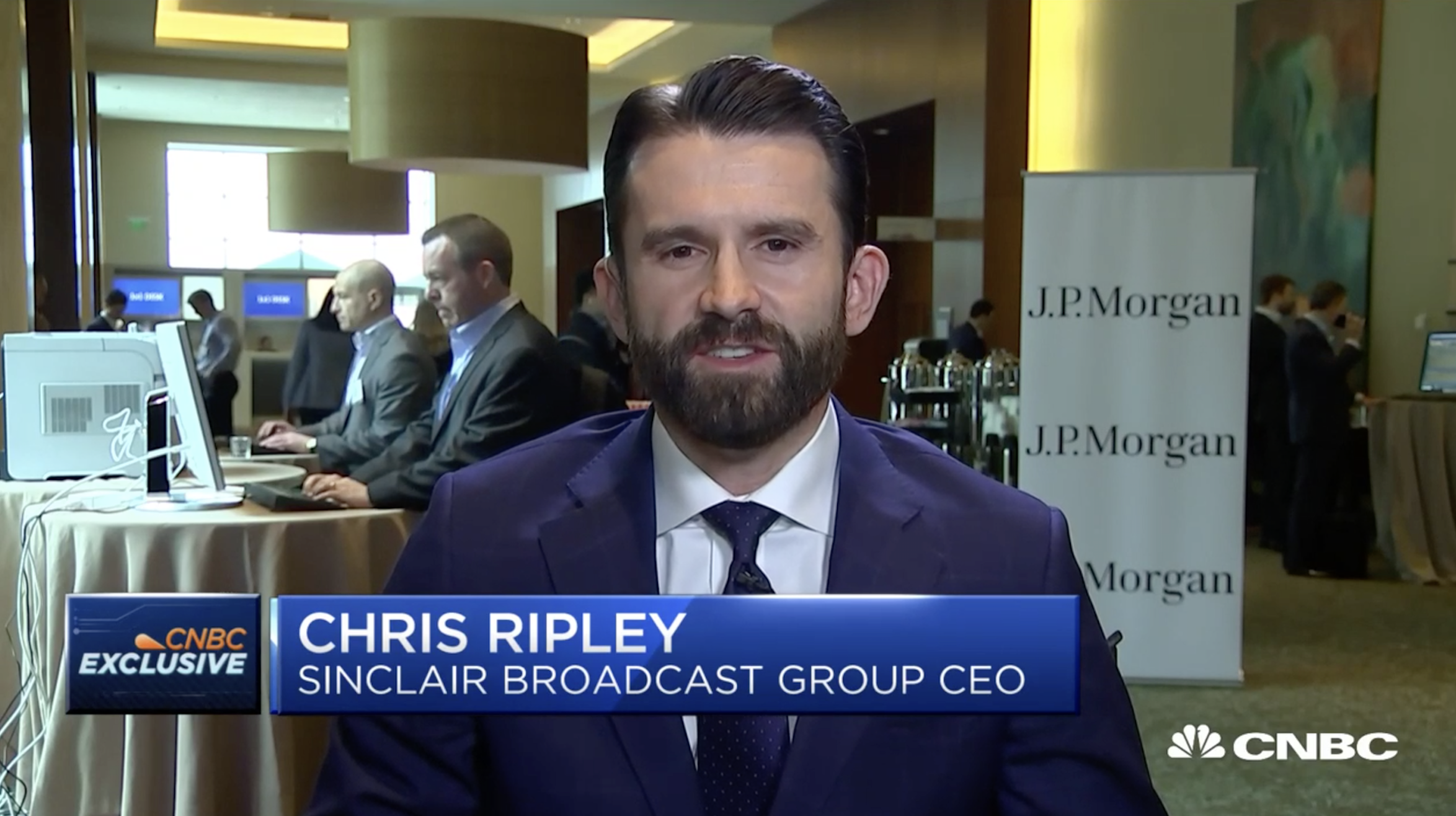Worry Over Sinclair’s Sporting Chances
The smarter way to stay on top of the multichannel video marketplace. Sign up below.
You are now subscribed
Your newsletter sign-up was successful
Since dealing to buy 21 regional sports networks, valued at $10.6 billion, from The Walt Disney Co., Sinclair Broadcast Group has seen a dramatic shift in sentiment as investors, worried about upcoming carriage deals, have driven the stock down more than 12% in the past two weeks.

Shares in Sinclair rocketed nearly 35% from $44.95 per share to $60.48 after it announced the deal, on May 6, as investors saw the addition of the RSNs as a way for Sinclair to not only solidify the retransmission-consent dominance for its TV stations, but also create new opportunities in advertising, legalized sports betting and for its streaming video service, STIRR.
On a conference call with analysts after the deal was announced, Sinclair CEO Chris Ripley said the deal would double the broadcast group’s annual revenue to $6.7 billion and nearly triple its cash flow from $900 million to $2.6 billion annually.
“We will become the leading local sports and news company in the country,” Ripley said. “There is a lot to like about this transaction.”
Investors thought so, too, driving Sinclair stock as high as $61.81 per share by May 10. But by May 13, the stock started to slip as investors began to worry whether upcoming carriage deals would prove more difficult than originally thought.
Bulk of Subs Up for Renewal
The former Fox Sports RSNs are slated to renew the vast majority of traditional linear carriage deals in the next two years. First up is Dish Network, with its 9.6 million satellite-TV and 2.4 million Sling TV OTT subscribers, in July. Then comes Charter Communications (16 million customers, in October); AT&T’s DirecTV and DirecTV Now (24 million subscribers, in September 2020); and Comcast (21.9 million video customers, in June 2020).
The smarter way to stay on top of the multichannel video marketplace. Sign up below.
Sinclair has been aggressive in retransmission-consent negotiations and most operators have feared that the station group — currently the largest with 191 TV stations in 89 markets — would use the combination of the RSNs and TV stations to drive up affiliate fees. Sinclair, which has never officially said it would do that, nevertheless drew ire from several industry lobbying groups over the deal.
ACA Connects, which represents more than 700 small, independent cable operators across the country, objected to the RSN purchase because it believed it would drive up pricing for critical programming.
“Big Four broadcast network programming and RSN programming are both critical for ACA Connects members,” the trade group declared on May 6. “By jointly negotiating these assets when they serve the same market, Sinclair can raise prices to cable operators for both offerings.”
In a note to clients, Wolfe Research managing director Marci Ryvicker wrote that some distributors have said privately that they would not allow Sinclair to make it so their retrans and RSN deals expired at the same time, something she said the station group never said it would do.
“My response is many fold,” Ryvicker said. “1) [Sinclair] negotiates these types of contracts all the time; 2) it is not like [Sinclair] didn’t know what it was getting into when it actually bid for these RSNs; 3) no one at [Sinclair] ever said it was trying to get these contracts coterminous; 4) [Sinclair] also said that affiliate fees will likely remain ‘status quo.’”
Other distributors pointed to the price Sinclair paid for the channels as evidence that they matter less to consumers than probably ever before. When the RSNs first went on the block in October — part of the conditions Disney agreed to for federal approval of a $71.3 billion purchase of certain 21st Century Fox assets — many analysts believed they would fetch a price north of $20 billion. Sinclair paid $9.6 billion in cash for the channels, and with its partners — Byron Allen’s Entertainment Studios owns a small piece of the entity that includes the RSNs — the networks are valued at about $10.6 billion.
The first big renewal might be a strong indication of Sinclair’s success or failure. It’s a tough test. While Dish declined to comment on the carriage talks, the satellite provider has taken an increasingly hard line on costs — it is currently in a seven-month dispute with HBO — and has been willing to drop sports networks in the past. For example, Dish has never carried the MSG Networks RSNs in the New York market.
Dish chairman Charlie Ergen said on the satellite provider’s first-quarter earnings call that Sinclair and Dish have been working together on ATSC 3.0, and he hoped the broadcaster was successful with the RSNs.
“I am hopeful we can be productive and get aligned in an agreement that will be aligned for both of us and that would be productive,” Ergen said of Sinclair. “We are pretty easy to work with as long as people look to do something that’s fair and not try to take advantage of the situation.”
Cable Exec: Sinclair Will Feel Pain
A cable executive who asked not to be named highlighted a dilemma for Sinclair even if it is able to pass through fee increases. Distributors will likely pay any increases imposed by Sinclair, the cable executive said, but will fully pass those costs onto consumers. The problem for Sinclair is that even if those increases result in more video customers cutting the cord, distributors won’t be that concerned. Video customers might bail out, but they more than likely will remain customers of higher-margin broadband products.
“Our disaster mitigation plan is good; for [Sinclair], it’s not so good,” the distributor said. ”Once Sinclair loses a customer, they’re gone. I don’t see how this ends well.”
